Marketing analytics
This example notebook shows how you can easily analyze traffic coming from Marketing campaigns, as measured via UTM tags. It’s also available as a full Jupyter notebook to run on your own data (see how to get started in your notebook), or you can instead run Objectiv Up to try it out. The dataset used here is the same as in Up.
Get started
We first have to instantiate the model hub and an Objectiv DataFrame object.
# set the timeframe of the analysis
start_date = '2022-08-01'
end_date = None
# instantiate the model hub, and set the default time aggregation to daily
# and set the global contexts that will be used in this example
from modelhub import ModelHub, display_sql_as_markdown
from bach import DataFrame
from sql_models.util import is_bigquery
import pandas as pd
modelhub = ModelHub(time_aggregation='%Y-%m-%d', global_contexts=['http', 'marketing', 'application'])
# get an Objectiv DataFrame within a defined timeframe
df = modelhub.get_objectiv_dataframe(db_url=DB_URL, start_date=start_date, end_date=end_date)
The location_stack column, and the columns taken from the global contexts, contain most of the
event-specific data. These columns are JSON typed, and we can extract data from it using the keys of the JSON
objects with SeriesLocationStack methods, or the context
accessor for global context columns. See the open taxonomy example for how to use
the location_stack and global contexts.
# add `feature_nice_name` and `root_location` as columns, so that we can use it for grouping etc. later
df['feature_nice_name'] = df.location_stack.ls.nice_name
df['root_location'] = df.location_stack.ls.get_from_context_with_type_series(type='RootLocationContext', key='id')
# derive a specific DataFrame with added marketing contexts
df_acquisition = df.copy()
# extract referrer and marketing contexts from the respective global contexts
df_acquisition['referrer'] = df_acquisition.http.context.referrer
df_acquisition['utm_source'] = df_acquisition.marketing.context.source
df_acquisition['utm_medium'] = df_acquisition.marketing.context.medium
df_acquisition['utm_campaign'] = df_acquisition.marketing.context.campaign
# also define a DataFrame with only the sessions that came in via a marketing campaign
campaign_sessions = df_acquisition[~df_acquisition['utm_source'].isnull()]['session_id'].unique()
df_marketing_only = df_acquisition[df_acquisition['session_id'].isin(campaign_sessions)]
# define a further selection: which source to select in the below analyses.
source_selection = ['twitter', 'reddit']
sources = DataFrame.from_pandas(engine=df.engine, df=pd.DataFrame({'sources': source_selection})).sources
# filter on defined list of UTM Sources
df_marketing_selection = df_marketing_only[(df_marketing_only.utm_source.isin(sources))]
# for BigQuery materialize the DataFrame as temporary tables to reduce the complexity of the underlying queries
if is_bigquery(df.engine):
df_acquisition = df_acquisition.materialize(materialization='temp_table')
df_marketing_only = df_marketing_only.materialize(materialization='temp_table')
df_marketing_selection = df_marketing_selection.materialize(materialization='temp_table')
Available dataframes:
df= all +feature_nice_name+root_location.df_acquisition=df+ referrer + UTMsdf_marketing_only=df_acquisition, but only sessions with non_nullutm_source.df_marketing_selection=df_marketing_only, but filtered for selection, e.g. onlyutm_sourcein{‘reddit’, ‘twitter’}.
Acquisition
Users from marketing
users_from_marketing_daily = modelhub.aggregate.unique_users(df_marketing_selection).sort_index(ascending=False)
users_from_marketing_daily_pdf = users_from_marketing_daily.to_pandas()
users_from_marketing_daily_pdf.head()
time_aggregation
2022-08-20 13
2022-08-19 12
2022-08-18 7
2022-08-17 10
2022-08-16 13
Name: unique_users, dtype: int64
users_from_marketing_daily_pdf.sort_index(ascending=True).plot(kind='bar', figsize=[15,5], title='Daily #users from marketing', xlabel='Day')
<AxesSubplot: title={'center': 'Daily #users from marketing'}, xlabel='Day'...>
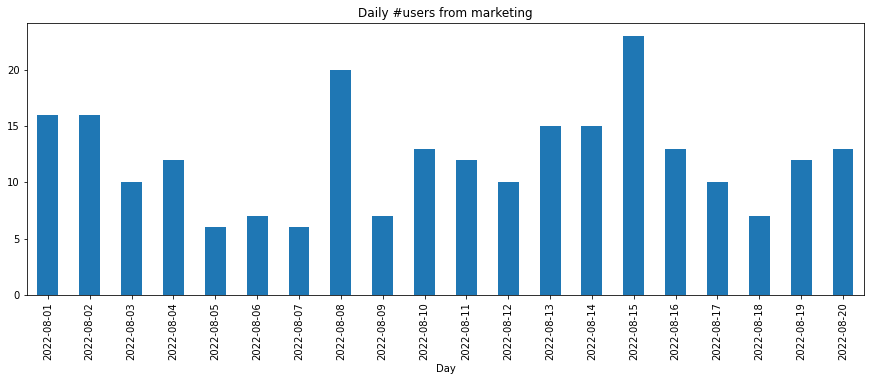
Users from marketing source per day
# users by marketing _source_, per day
source_users_daily = modelhub.agg.unique_users(df_marketing_selection, groupby=['day', 'utm_source'])
source_users_daily = source_users_daily.reset_index().sort_values('day', ascending=False)
source_users_daily_pdf = source_users_daily.to_pandas()
source_users_daily_pdf.head(20)
day utm_source unique_users
0 2022-08-20 twitter 7
1 2022-08-20 reddit 6
2 2022-08-19 twitter 9
3 2022-08-19 reddit 3
4 2022-08-18 reddit 3
5 2022-08-18 twitter 4
6 2022-08-17 twitter 6
7 2022-08-17 reddit 4
8 2022-08-16 twitter 10
9 2022-08-16 reddit 3
10 2022-08-15 twitter 19
11 2022-08-15 reddit 4
12 2022-08-14 twitter 10
13 2022-08-14 reddit 5
14 2022-08-13 twitter 8
15 2022-08-13 reddit 7
16 2022-08-12 twitter 8
17 2022-08-12 reddit 2
18 2022-08-11 reddit 3
19 2022-08-11 twitter 9
sud = source_users_daily_pdf.pivot(index='day', columns='utm_source')
sud.plot.bar(stacked=True)
<AxesSubplot: xlabel='day'>
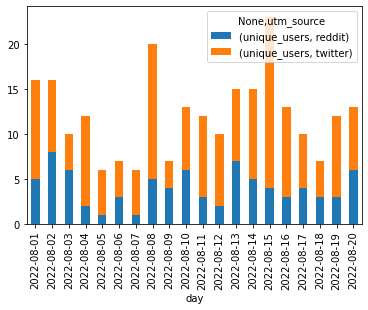
Users from marketing campaign per day
# users by marketing _campaign_ (based on UTM data), per day
users_per_campaign_daily = modelhub.aggregate.unique_users(df_marketing_selection, ['day', 'utm_source', 'utm_medium', 'utm_campaign'])
users_per_campaign_daily.reset_index().sort_values('day', ascending=False).head(20)
day utm_source utm_medium utm_campaign unique_users
0 2022-08-20 reddit paid july_conversion 6
1 2022-08-20 twitter paid july_conversion 7
2 2022-08-19 reddit paid july_conversion 3
3 2022-08-19 twitter paid july_conversion 9
4 2022-08-18 twitter social blog 1
5 2022-08-18 twitter paid july_conversion 3
6 2022-08-18 reddit paid july_conversion 3
7 2022-08-17 twitter paid july_conversion 6
8 2022-08-17 reddit paid july_conversion 4
9 2022-08-16 twitter paid july_conversion 10
10 2022-08-16 reddit paid july_conversion 3
11 2022-08-15 twitter paid july_conversion 19
12 2022-08-15 reddit paid july_conversion 4
13 2022-08-14 reddit paid july_conversion 5
14 2022-08-14 twitter paid july_conversion 10
15 2022-08-13 twitter paid july_conversion 8
16 2022-08-13 reddit paid july_conversion 7
17 2022-08-12 reddit paid july_conversion 2
18 2022-08-12 twitter paid july_conversion 8
19 2022-08-11 reddit paid july_conversion 3
Referrers overall
# users by referrer in full timeframe (overall, including coming from marketing campaigns)
referrer_users = modelhub.agg.unique_users(df_acquisition, groupby=['referrer']).sort_values(ascending=False)
referrer_users.head(20)
referrer
392
https://www.reddit.com/ 82
https://www.google.com/ 80
https://t.co/ 27
https://github.com/objectiv/objectiv-analytics 21
https://www.linkedin.com/ 19
https://www.kdnuggets.com/ 14
https://github.com/RunaCapital/awesome-oss-alternatives 12
https://github.com/ 9
https://www.fly.vc/ 6
https://bohr.atomico.com/ 4
https://objectiv.io/docs/modeling/ 4
https://news.ycombinator.com/ 4
https://stackshare.io/ 3
android-app://com.linkedin.android/ 3
https://snowplowanalytics.com/ 3
https://okt.to/ 3
https://www.google.nl/ 3
android-app://com.slack/ 2
https://objectiv.io/docs/home/quickstart-guide/ 2
Name: unique_users, dtype: int64
Conversion
See conversion overall and from marketing. Conversion in this example is defined as clicking any link on the website or docs to our GitHub repo.
# define the conversion event in `df_acquisition` and `df_marketing_selection`
# in this example: clicking any link leading to our GitHub repo
# create a column that extracts all location stacks that lead to our GitHub repo
df_acquisition['ls_conversion'] = df_acquisition[(df_acquisition.location_stack.ls[:{'_type':'LinkContext', 'id':'browse-on-github'}] != []) | (df_acquisition.location_stack.ls[:{'_type':'LinkContext', 'id':'github-stars-button'}] != []) | (df_acquisition.location_stack.ls[:{'_type':'LinkContext', 'id':'github'}] != [])].location_stack
modelhub.add_conversion_event(location_stack=df_acquisition['ls_conversion'], event_type='PressEvent', name='github_press')
df_marketing_selection['ls_conversion'] = df_marketing_selection[(df_marketing_selection.location_stack.ls[:{'_type':'LinkContext', 'id':'browse-on-github'}] != []) | (df_marketing_selection.location_stack.ls[:{'_type':'LinkContext', 'id':'github-stars-button'}] != []) | (df_marketing_selection.location_stack.ls[:{'_type':'LinkContext', 'id':'github'}] != [])].location_stack
modelhub.add_conversion_event(location_stack=df_marketing_selection['ls_conversion'], event_type='PressEvent', name='github_press_marketing')
df_acquisition['is_conversion_event'] = modelhub.map.is_conversion_event(df_acquisition, 'github_press')
df_marketing_selection['is_conversion_event'] = modelhub.map.is_conversion_event(df_marketing_selection, 'github_press_marketing')
Daily conversions from marketing
# calculate daily conversions from marketing (based on UTM data)
conversions_from_marketing = df_marketing_selection[df_marketing_selection.is_conversion_event].dropna(axis=0, how='any', subset='utm_source')
conversions_from_marketing_daily = modelhub.aggregate.unique_users(conversions_from_marketing).sort_index(ascending=False)
conversions_from_marketing_daily_pdf = conversions_from_marketing_daily.to_pandas()
conversions_from_marketing_daily_pdf.head()
time_aggregation
2022-08-20 1
2022-08-16 1
2022-08-14 2
2022-08-13 2
2022-08-04 1
Name: unique_users, dtype: int64
conversions_from_marketing_daily_pdf.sort_index(ascending=True).plot(kind='bar', figsize=[15,5], title='Daily #conversions from marketing', xlabel='Day')
<AxesSubplot: title={'center': 'Daily #conversions from marketing'}, xlabel='Day'>
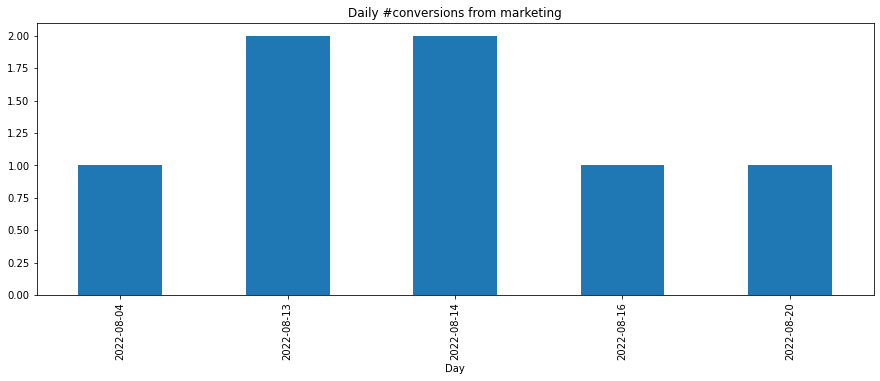
Daily conversion rate from marketing
# calculate daily conversion rate from marketing campaigns overall
# divide conversions from campaigns by total daily number of people coming from campaigns
conversion_rate_from_marketing = ((conversions_from_marketing_daily / users_from_marketing_daily) * 100).fillna(0.0)
conversion_rate_from_marketing_pdf = conversion_rate_from_marketing.sort_index(ascending=False).to_pandas()
conversion_rate_from_marketing_pdf.head(10)
time_aggregation
2022-08-20 7.692308
2022-08-19 0.000000
2022-08-18 0.000000
2022-08-17 0.000000
2022-08-16 7.692308
2022-08-15 0.000000
2022-08-14 13.333333
2022-08-13 13.333333
2022-08-12 0.000000
2022-08-11 0.000000
Name: unique_users, dtype: float64
conversion_rate_from_marketing_pdf.sort_index(ascending=True).plot(kind='line', figsize=[15,5], title='Daily conversion rate from marketing', xlabel='Day')
<AxesSubplot: title={'center': 'Daily conversion rate from marketing'}, xlabel='Day'>
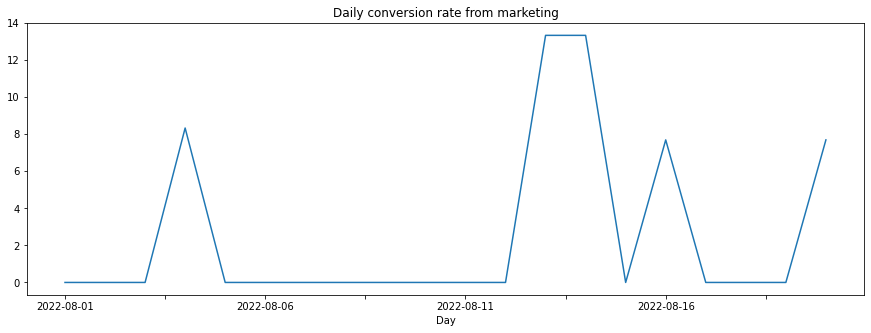
# combined DataFrame with #conversions + conversion rate, daily
conversions_from_marketing_plus_rate = conversions_from_marketing_daily.to_frame().merge(conversion_rate_from_marketing.to_frame(), on='time_aggregation', how='left').sort_index(ascending=False)
conversions_from_marketing_plus_rate = conversions_from_marketing_plus_rate.rename(columns={'unique_users_x': 'converted_users', 'unique_users_y': 'conversion_rate'})
conversions_from_marketing_plus_rate.head()
converted_users conversion_rate
time_aggregation
2022-08-20 1 7.692308
2022-08-16 1 7.692308
2022-08-14 2 13.333333
2022-08-13 2 13.333333
2022-08-04 1 8.333333
Daily conversions overall
# calculate daily conversions overall (including from marketing campaigns)
conversions_overall = modelhub.aggregate.unique_users(df_acquisition[df_acquisition.is_conversion_event])
conversions_overall_pdf = conversions_overall.sort_index(ascending=False).to_pandas()
conversions_overall_pdf.head()
time_aggregation
2022-08-20 1
2022-08-18 2
2022-08-17 4
2022-08-16 3
2022-08-15 3
Name: unique_users, dtype: int64
>>> # plot daily conversions overall (including from marketing campaigns)
>>> conversions_overall_pdf.sort_index(ascending=True).plot(kind='bar', figsize=[15,5], title='Daily #conversions overall', xlabel='Day')
<AxesSubplot: title={'center': 'Daily #conversions overall'}, xlabel='Day'>
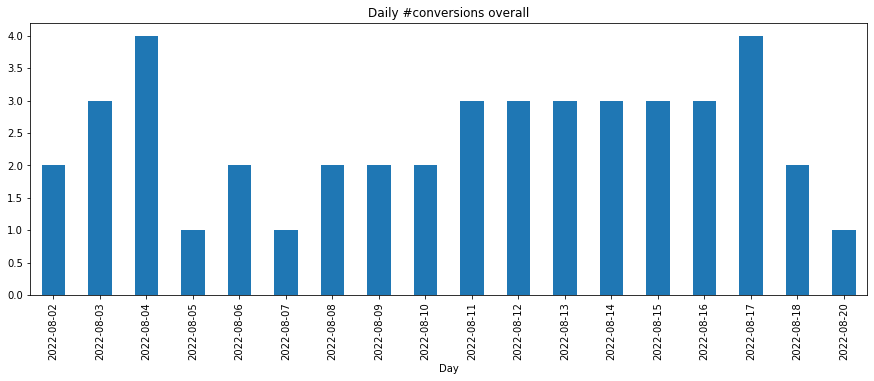
Daily conversion rate overall
# calculate daily conversion rate overall (including from marketing campaigns)
daily_users = modelhub.aggregate.unique_users(df_acquisition).sort_index(ascending=False)
conversion_rate_overall = (conversions_overall / daily_users) * 100
conversion_rate_overall_pdf = conversion_rate_overall.sort_index(ascending=False).fillna(0.0).to_pandas()
conversion_rate_overall_pdf.head(10)
time_aggregation
2022-08-20 3.703704
2022-08-19 0.000000
2022-08-18 8.000000
2022-08-17 11.428571
2022-08-16 8.108108
2022-08-15 5.660377
2022-08-14 8.108108
2022-08-13 10.000000
2022-08-12 7.692308
2022-08-11 5.660377
Name: unique_users, dtype: float64
>>> conversion_rate_overall_pdf.sort_index(ascending=True).plot(kind='line', figsize=[15,5], title='Daily conversion rate overall', xlabel='Day')
<AxesSubplot: title={'center': 'Daily conversion rate overall'}, xlabel='Day'>
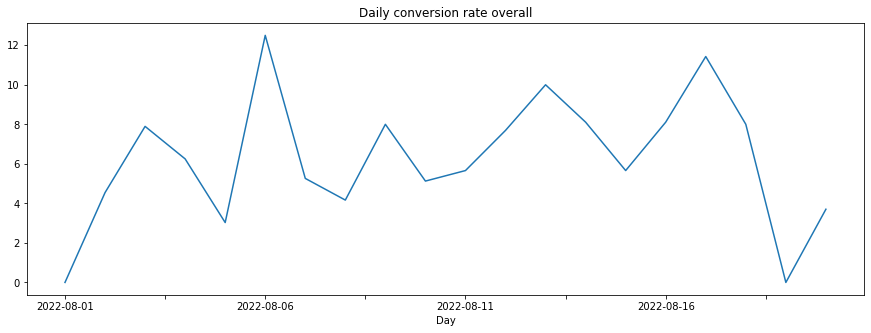
Conversion split by source & campaign
Conversions per marketing source daily
# split daily conversions by marketing _source_ (based on UTM data)
campaign_conversions_source_daily = modelhub.aggregate.unique_users(df_marketing_selection[df_marketing_selection.is_conversion_event], ['day', 'utm_source'])
campaign_conversions_source_daily.reset_index().dropna(axis=0, how='any', subset='utm_source').set_index('day').sort_index(ascending=False).head()
utm_source unique_users
day
2022-08-20 reddit 1
2022-08-16 reddit 1
2022-08-14 twitter 2
2022-08-13 reddit 2
2022-08-04 twitter 1
Conversions per marketing campaign daily
# split daily conversions by marketing _campaign_ (based on UTM data)
campaign_conversions_campaign_daily = modelhub.aggregate.unique_users(df_marketing_selection[df_marketing_selection.is_conversion_event], ['day', 'utm_source', 'utm_campaign'])
campaign_conversions_campaign_daily.reset_index().dropna(axis=0, how='any', subset='utm_campaign').set_index('day').sort_index(ascending=False).head(10)
utm_source utm_campaign unique_users
day
2022-08-20 reddit july_conversion 1
2022-08-16 reddit july_conversion 1
2022-08-14 twitter july_conversion 2
2022-08-13 reddit july_conversion 2
2022-08-04 twitter july_conversion 1
Duration
Avg. duration per ad source
# avg duration for users that come from an ad campaign in the full timeframe
duration_per_source = modelhub.aggregate.session_duration(df_marketing_selection, groupby=['utm_source']).to_frame()
duration_per_source.sort_values(['utm_source'], ascending=False).head(10)
session_duration
utm_source
twitter 0 days 00:01:31.449472
reddit 0 days 00:01:04.909909
Vs. avg. duration by all users
# vs time spent by all users
modelhub.aggregate.session_duration(df_acquisition, groupby=None).to_frame().head()
session_duration
0 0 days 00:03:48.160022
Avg. duration before first conversion per _source
Avg. duration per campaign source for users who converted for the very first time (not including hits or sessions after the moment of conversion).
# avg duration before conversion - per source
# label sessions with a conversion
df_marketing_selection['converted_users'] = modelhub.map.conversions_counter(df_marketing_selection, name='github_press') >= 1
# label hits where at that point in time, there are 0 conversions in the session
df_marketing_selection['zero_conversions_at_moment'] = modelhub.map.conversions_in_time(df_marketing_selection, 'github_press') == 0
# filter on above created labels to find the users who converted for the very first time
converted_users = df_marketing_selection[(df_marketing_selection.converted_users & df_marketing_selection.zero_conversions_at_moment)]
modelhub.aggregate.session_duration(converted_users, groupby=['utm_source']).to_frame().head()
session_duration
utm_source
reddit 0 days 00:00:17.502500
twitter 0 days 00:01:44.533667
To filter out bounces, use parameter exclude_bounces=True for the session_duration model.
Duration & conversions
# see daily duration & conversions per ad _source_
# first calculate time spent per campaign source, daily
duration_per_source_daily = modelhub.agg.session_duration(df_marketing_selection, groupby=['utm_source', 'day']).to_frame()
# calculate the number of users per campaign source, daily
source_users_daily = modelhub.agg.unique_users(df_acquisition, groupby=['utm_source', 'day'])
source_users_daily = source_users_daily.reset_index()
# add them together
source_duration_users_daily = duration_per_source_daily.merge(source_users_daily, how='left', on=['utm_source', 'day']);
# also add #conversions
converted_users = campaign_conversions_source_daily.to_frame().rename(columns={"unique_users": "converted_users"})
source_duration_users_daily = source_duration_users_daily.merge(converted_users, how='left', on=['utm_source', 'day'])
source_duration_users_daily = source_duration_users_daily.sort_values(['utm_source', 'day'], ascending=False)
source_duration_users_daily.head(20)
session_duration unique_users converted_users
utm_source day
twitter 2022-08-20 0 days 00:02:54.795125 7 NaN
2022-08-19 0 days 00:08:50.363750 9 NaN
2022-08-18 0 days 00:00:13.853333 4 NaN
2022-08-17 0 days 00:00:17.638400 6 NaN
2022-08-16 0 days 00:01:22.959429 10 NaN
2022-08-15 0 days 00:00:41.717133 19 NaN
2022-08-14 0 days 00:01:23.530200 10 2.0
2022-08-13 0 days 00:01:08.181000 8 NaN
2022-08-12 0 days 00:00:08.564000 8 NaN
2022-08-11 0 days 00:00:15.621500 9 NaN
2022-08-10 0 days 00:00:23.947714 7 NaN
2022-08-08 0 days 00:03:13.881900 15 NaN
2022-08-07 0 days 00:00:16.193333 5 NaN
2022-08-05 0 days 00:00:01.339500 5 NaN
2022-08-04 0 days 00:01:03.227500 10 1.0
2022-08-03 0 days 00:05:55.457000 4 NaN
2022-08-02 0 days 00:00:09.290600 8 NaN
2022-08-01 0 days 00:00:39.053833 11 NaN
reddit 2022-08-20 0 days 00:00:17.293333 6 1.0
2022-08-19 0 days 00:00:46.239000 3 NaN
Deep-dive into user behavior from marketing
Top used product features for users from marketing campaigns
# top used product features for users coming from marketing campaigns
top_product_features_from_marketing = modelhub.aggregate.top_product_features(df_marketing_selection)
top_product_features_from_marketing.head(20)
user_id_nunique
application feature_nice_name event_type
objectiv-website Link: about-us located at Root Location: home => Navigation: navbar-top PressEvent 16
Link: spin-up-the-demo located at Root Location: home => Content: hero PressEvent 11
Link: docs located at Root Location: home => Navigation: navbar-top PressEvent 8
Link: blog located at Root Location: home => Navigation: navbar-top PressEvent 5
Link: browse-on-github located at Root Location: home => Content: hero PressEvent 4
Link: jobs located at Root Location: home => Navigation: navbar-top PressEvent 4
Link: spin-up-the-demo located at Root Location: home => Content: try-it PressEvent 4
Link: github located at Root Location: home => Navigation: navbar-top PressEvent 3
Link: logo located at Root Location: blog => Navigation: navbar-top PressEvent 3
Link: docs-open-model-hub located at Root Location: home => Content: solution PressEvent 2
Link: logo located at Root Location: home => Navigation: navbar-top PressEvent 2
Link: faq located at Root Location: home => Navigation: navbar-top PressEvent 2
Pressable: hamburger located at Root Location: home => Navigation: navbar-top PressEvent 1
Link: about-us located at Root Location: home => Navigation: navbar-top => Overlay: hambur... PressEvent 1
Link: docs located at Root Location: blog => Navigation: navbar-top => Overlay: hamburger-... PressEvent 1
Link: docs-modeling located at Root Location: home => Content: solution PressEvent 1
Link: docs-taxonomy located at Root Location: home => Content: solution PressEvent 1
Link: docs-taxonomy located at Root Location: home => Content: taxonomy PressEvent 1
Link: open-model-hub located at Root Location: home => Content: data-modeling PressEvent 1
Link: privacy-policy located at Root Location: home => Navigation: footer PressEvent 1
Top used product features for users from marketing campaigns, before they convert
# top used product features for users coming from marketing campaigns, before they convert
if is_bigquery(df.engine):
df_marketing_selection = df_marketing_selection.materialize(materialization='temp_table')
top_features_before_conversion_from_marketing = modelhub.agg.top_product_features_before_conversion(df_marketing_selection, name='github_press')
top_features_before_conversion_from_marketing.head(20)
unique_users
application feature_nice_name event_type
objectiv-website Link: about-us located at Root Location: home => Navigation: navbar-top PressEvent 1
Funnel Discovery: flows for all users from marketing campaigns
# select which event type to use for further analysis - PressEvents to focus on what users directly interact with
df_funnel_from_marketing = df_marketing_selection[df_marketing_selection['event_type'] == 'PressEvent']
# instantiate the FunnelDiscovery model from the open model hub
funnel = modelhub.get_funnel_discovery()
# set the maximum n steps
max_steps = 4
# for every user starting their session, find all maximum n consecutive steps they took
df_steps = funnel.get_navigation_paths(df_funnel_from_marketing, steps=max_steps, by='user_id')
df_steps.head()
location_stack_step_1 location_stack_step_2 location_stack_step_3 location_stack_step_4
user_id
00d9abb7-8f5b-40ef-b189-4b046450eb3d Link: about-us located at Root Location: home => Navigation: navbar-top None None None
06186850-48e2-49b1-963f-8615eab56f30 Link: about-us located at Root Location: home => Navigation: navbar-top None None None
10a4beb9-a55b-4d30-8975-2c3c23015c1d Link: docs located at Root Location: home => Navigation: navbar-top Link: about-us located at Root Location: home => Navigation: navbar-top None None
11311189-2e02-458d-b474-9137b7d9d8f3 Link: faq located at Root Location: home => Navigation: navbar-top None None None
132ef6df-8f7f-42a6-9a33-b63f3f408309 Link: spin-up-the-demo located at Root Location: home => Content: hero None None None
funnel.plot_sankey_diagram(df_steps, n_top_examples=50)
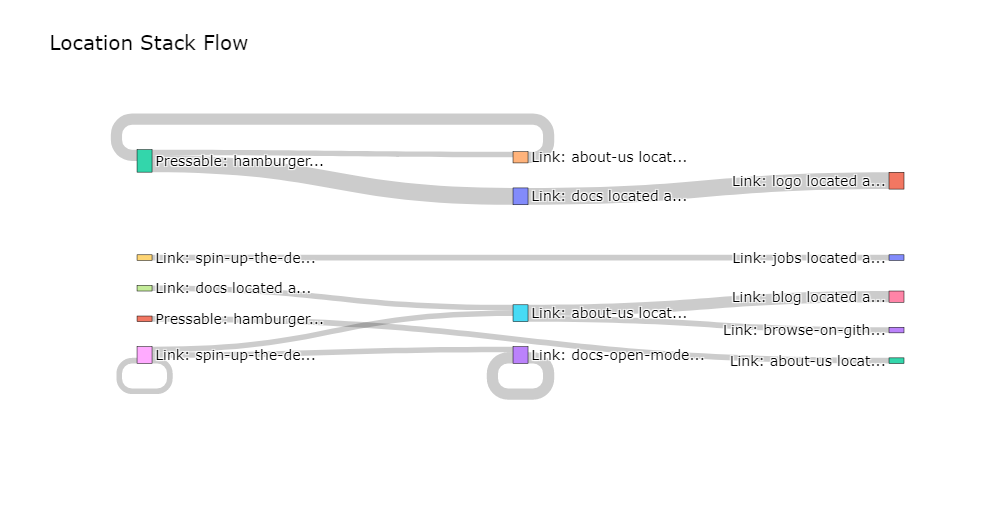
Funnel Discovery: flows for converted users from marketing
# add which step resulted in conversion to the dataframe, with the `add_conversion_step_column` param
# filter down to all sequences that have actually converted with the `only_converted_paths` param
df_steps_till_conversion = funnel.get_navigation_paths(df_funnel_from_marketing, steps=max_steps, by='user_id', add_conversion_step_column=True, only_converted_paths=True)
df_steps_till_conversion.head(5)
location_stack_step_1 location_stack_step_2 location_stack_step_3 location_stack_step_4 _first_conversion_step_number
user_id
99f741a0-d05e-4688-8bd9-53f66bf926aa Link: about-us located at Root Location: home => Navigation: navbar-top Link: browse-on-github located at Root Location: home => Content: hero None None 2
# plot the Sankey diagram using the top examples via the `n_top_examples` param
condition_convert_on_step = df_steps_till_conversion['_first_conversion_step_number'] == 2
funnel.plot_sankey_diagram(df_steps_till_conversion[condition_convert_on_step], n_top_examples=15)
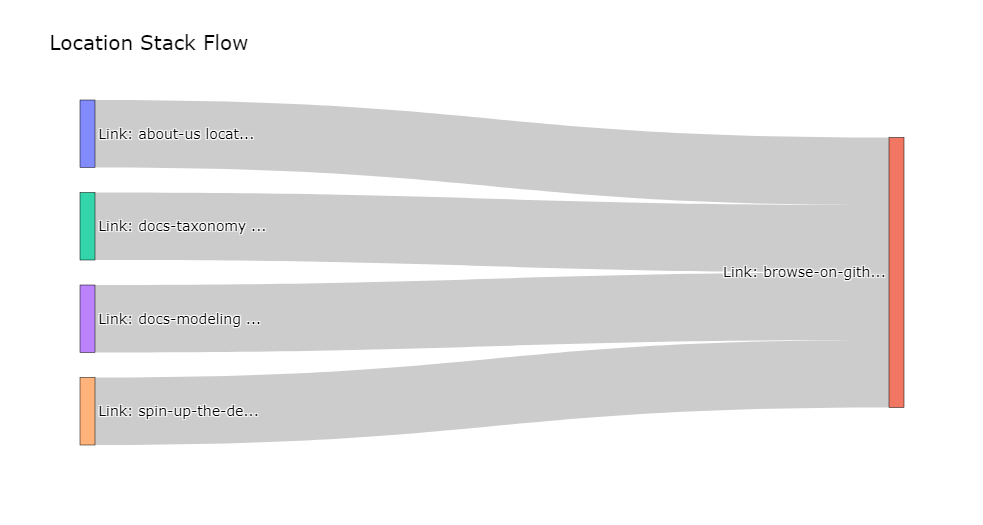
Funnel Discovery: drop-off for users from marketing
# select only non-converted users
df_funnel_non_converted = df_marketing_selection[~df_marketing_selection['is_conversion_event']]
funnel_converted_users = df_marketing_selection[df_marketing_selection['is_conversion_event']]['user_id']
# select the events of these non converted users
df_funnel_non_converted = df_funnel_non_converted[~df_funnel_non_converted['user_id'].isin(funnel_converted_users)]
# get the last used feature in the location_stack before dropping off
modelhub.aggregate.drop_off_locations(df_funnel_non_converted, groupby='user_id', percentage=True).head(10)
percentage
location
Root Location: home 50.691244
Overlay: star-us-notification-overlay located at Root Location: home => Pressable: star-us... 46.543779
Root Location: blog 1.843318
Content: post-release-objectiv-now-has-support-for-deepnote located at Root Location: blog 0.921659
Predict User Behavior from campaigns
You can run predictive modeling on your marketing data as well. For example, you can create a feature for the number of times a user came in through a specific marketing source.
The created marketing feature set can be merged with any user-level feature set for logistic regression, like
features_set_sample from the logistic regression example notebook.
For more details on how to do feature engineering, see our
feature engineering example notebook.
# create a feature for the number of times a user came in through a specific marketing source:
feature_prepare = df_acquisition.copy()
feature_prepare['utm_source'] = feature_prepare.utm_source.fillna('none')
features_us = feature_prepare.groupby(['user_id', 'utm_source']).session_id.nunique()
features_us_unstacked = features_us.unstack(fill_value=0)
features_us_unstacked.head()
reddit linkedin twitter none reactdigest
user_id
00d9abb7-8f5b-40ef-b189-4b046450eb3d 0 0 1 1 0
00f4ce36-a3dd-4830-a379-9d4d83340d34 0 0 1 0 0
01db2734-458c-4381-9761-1fbb5804cdd3 0 0 1 0 0
023ec189-91de-4458-9b46-6ac948b6d8b8 0 0 0 3 0
028552a8-5951-435e-ab2b-e1278bfc7d41 0 0 0 1 0
Get the SQL for any analysis
The SQL for any analysis can be exported with one command, so you can use models in production directly to simplify data debugging & delivery to BI tools like Metabase, dbt, etc. See how you can quickly create BI dashboards with this.
# show the underlying SQL for this dataframe - works for any dataframe/model in Objectiv
display_sql_as_markdown(users_from_marketing_daily)
CREATE
TEMPORARY TABLE "manual_materialize___09753d8bca37b01432f8298dc5cad15e"
ON COMMIT DROP AS WITH "loaded_data___f55033d1a2c6bc0844c0ded4ab5a824e" AS (
SELECT *
FROM (VALUES (cast(0 AS bigint), 'twitter'), (cast(1 AS bigint), 'reddit')) AS t("_index_0", "sources")
),
"manual_materialize___efb4f018e85fabff63563129f1bb352c" AS (
SELECT "event_id" AS "event_id",
"day" AS "day",
"moment" AS "moment",
"cookie_id" AS "user_id",
cast("value"->>'_type' AS text) AS "event_type",
cast(cast("value"->>'_types' AS text) AS JSONB) AS "stack_event_types",
cast(cast("value"->>'location_stack' AS text) AS JSONB) AS "location_stack",
cast(cast("value"->>'time' AS text) AS bigint) AS "time",
jsonb_path_query_array(cast(cast("value"->>'global_contexts' AS text) AS JSONB), '$[*] ? (@._type == $type)', '{"type":"HttpContext"}') AS "http",
jsonb_path_query_array(cast(cast("value"->>'global_contexts' AS text) AS JSONB), '$[*] ? (@._type == $type)', '{"type":"MarketingContext"}') AS "marketing",
jsonb_path_query_array(cast(cast("value"->>'global_contexts' AS text) AS JSONB), '$[*] ? (@._type == $type)', '{"type":"ApplicationContext"}') AS "application"
FROM "data"
),
"getitem_where_boolean___e2841342be46f8d04edb53cf68a0ac81" AS (
SELECT "event_id" AS "event_id",
"day" AS "day",
"moment" AS "moment",
"user_id" AS "user_id",
"event_type" AS "event_type",
"stack_event_types" AS "stack_event_types",
"location_stack" AS "location_stack",
"time" AS "time",
"http" AS "http",
"marketing" AS "marketing",
"application" AS "application"
FROM "manual_materialize___efb4f018e85fabff63563129f1bb352c"
WHERE ((("day" >= cast('2022-08-01' AS date))) AND (("day" <= cast('2022-08-20' AS date))))
),
"context_data___b40089f052f51067dea413fb92b276de" AS (
SELECT "event_id" AS "event_id",
"day" AS "day",
"moment" AS "moment",
"user_id" AS "user_id",
"location_stack" AS "location_stack",
"event_type" AS "event_type",
"stack_event_types" AS "stack_event_types",
"http" AS "http",
"marketing" AS "marketing",
"application" AS "application"
FROM "getitem_where_boolean___e2841342be46f8d04edb53cf68a0ac81"
),
"session_starts___393d7f6aa9bf25e9defe5f31065b8bd4" AS (
SELECT "event_id" AS "event_id",
"day" AS "day",
"moment" AS "moment",
"user_id" AS "user_id",
"location_stack" AS "location_stack",
"event_type" AS "event_type",
"stack_event_types" AS "stack_event_types",
"http" AS "http",
"marketing" AS "marketing",
"application" AS "application",
CASE WHEN (extract(epoch FROM (("moment") - (lag("moment", 1, cast(NULL AS timestamp WITHOUT TIME ZONE)) OVER (PARTITION BY "user_id" ORDER BY "moment" ASC NULLS LAST, "event_id" ASC NULLS LAST RANGE BETWEEN UNBOUNDED PRECEDING AND CURRENT ROW)))) <= cast(1800 AS bigint)) THEN cast(NULL AS boolean)
ELSE cast(TRUE AS boolean)
END AS "is_start_of_session"
FROM "context_data___b40089f052f51067dea413fb92b276de"
),
"session_id_and_count___f506e1570063eba5819aa050b61dea24" AS (
SELECT "event_id" AS "event_id",
"day" AS "day",
"moment" AS "moment",
"user_id" AS "user_id",
"location_stack" AS "location_stack",
"event_type" AS "event_type",
"stack_event_types" AS "stack_event_types",
"http" AS "http",
"marketing" AS "marketing",
"application" AS "application",
"is_start_of_session" AS "is_start_of_session",
CASE WHEN "is_start_of_session" THEN row_number() OVER (PARTITION BY "is_start_of_session" ORDER BY "moment" ASC NULLS LAST, "event_id" ASC NULLS LAST RANGE BETWEEN UNBOUNDED PRECEDING AND CURRENT ROW)
ELSE cast(NULL AS bigint)
END AS "session_start_id",
count("is_start_of_session") OVER (ORDER BY "user_id" ASC NULLS LAST, "moment" ASC NULLS LAST, "event_id" ASC NULLS LAST RANGE BETWEEN UNBOUNDED PRECEDING AND CURRENT ROW) AS "is_one_session"
FROM "session_starts___393d7f6aa9bf25e9defe5f31065b8bd4"
),
"objectiv_sessionized_data___d49314c956644a252ed9bf9aecb549cf" AS (
SELECT "event_id" AS "event_id",
"day" AS "day",
"moment" AS "moment",
"user_id" AS "user_id",
"location_stack" AS "location_stack",
"event_type" AS "event_type",
"stack_event_types" AS "stack_event_types",
"http" AS "http",
"marketing" AS "marketing",
"application" AS "application",
"is_start_of_session" AS "is_start_of_session",
"session_start_id" AS "session_start_id",
"is_one_session" AS "is_one_session",
first_value("session_start_id") OVER (PARTITION BY "is_one_session" ORDER BY "moment" ASC NULLS LAST, "event_id" ASC NULLS LAST RANGE BETWEEN UNBOUNDED PRECEDING AND CURRENT ROW) AS "session_id",
row_number() OVER (PARTITION BY "is_one_session" ORDER BY "moment" ASC NULLS LAST, "event_id" ASC NULLS LAST RANGE BETWEEN UNBOUNDED PRECEDING AND CURRENT ROW) AS "session_hit_number"
FROM "session_id_and_count___f506e1570063eba5819aa050b61dea24"
),
"getitem_where_boolean___79f5db3a42d1af0a8b768c1e2219bb1e" AS (
SELECT "event_id" AS "event_id",
"day" AS "day",
"moment" AS "moment",
"user_id" AS "user_id",
"location_stack" AS "location_stack",
"event_type" AS "event_type",
"stack_event_types" AS "stack_event_types",
"session_id" AS "session_id",
"session_hit_number" AS "session_hit_number",
"http" AS "http",
"marketing" AS "marketing",
"application" AS "application",
(
SELECT string_agg(replace(regexp_replace(value ->> '_type', '([a-z])([A-Z])', '\1 \2', 'g'), ' Context', '') || ': ' || (value ->> 'id'), ' => ')
FROM jsonb_array_elements("location_stack") WITH
ORDINALITY
WHERE
ORDINALITY = jsonb_array_length("location_stack")
) || (CASE WHEN jsonb_array_length("location_stack") > 1 THEN ' located at ' || (SELECT string_agg(replace(regexp_replace(value ->> '_type', '([a-z])([A-Z])', '\1 \2', 'g'), ' Context', '') || ': ' || (value ->> 'id'), ' => ') FROM jsonb_array_elements("location_stack") WITH ORDINALITY WHERE ORDINALITY < jsonb_array_length("location_stack") ) ELSE '' END) AS "feature_nice_name",
cast(coalesce((SELECT jsonb_agg(x.value) FROM jsonb_array_elements("location_stack") WITH ORDINALITY x WHERE ORDINALITY - 1 >= (SELECT min(CASE WHEN ('{"_type": "RootLocationContext"}'::JSONB) <@ value THEN ORDINALITY END) -1 FROM jsonb_array_elements("location_stack") WITH ORDINALITY)), '[]'::JSONB)->0->>'id' AS text) AS "root_location",
cast("http"->0->>'referrer' AS text) AS "referrer",
cast("marketing"->0->>'source' AS text) AS "utm_source",
cast("marketing"->0->>'medium' AS text) AS "utm_medium",
cast("marketing"->0->>'campaign' AS text) AS "utm_campaign"
FROM "objectiv_sessionized_data___d49314c956644a252ed9bf9aecb549cf"
WHERE NOT ((cast("marketing"->0->>'source' AS text) IS NULL))
),
"getitem_where_boolean___f40bb74f5ffb0963d90bbdc8a09c1c80" AS (
SELECT "session_id" AS "session_id"
FROM "getitem_where_boolean___79f5db3a42d1af0a8b768c1e2219bb1e"
WHERE NOT (((("session_id" IS NULL)) OR (("session_id" = cast('nan' AS double precision)))))
),
"manual_materialize___5ecbb278e6f0b2932d88cc727dcc1a28" AS (
SELECT DISTINCT "session_id" AS "session_id"
FROM "getitem_where_boolean___f40bb74f5ffb0963d90bbdc8a09c1c80"
),
"getitem_where_boolean___2197e3c49f7488ee499e9b17323a8996" AS (
SELECT "event_id" AS "event_id",
"day" AS "day",
"moment" AS "moment",
"user_id" AS "user_id",
"location_stack" AS "location_stack",
"event_type" AS "event_type",
"stack_event_types" AS "stack_event_types",
"session_id" AS "session_id",
"session_hit_number" AS "session_hit_number",
"http" AS "http",
"marketing" AS "marketing",
"application" AS "application",
(
SELECT string_agg(replace(regexp_replace(value ->> '_type', '([a-z])([A-Z])', '\1 \2', 'g'), ' Context', '') || ': ' || (value ->> 'id'), ' => ')
FROM jsonb_array_elements("location_stack") WITH
ORDINALITY
WHERE
ORDINALITY = jsonb_array_length("location_stack")
) || (CASE WHEN jsonb_array_length("location_stack") > 1 THEN ' located at ' || (SELECT string_agg(replace(regexp_replace(value ->> '_type', '([a-z])([A-Z])', '\1 \2', 'g'), ' Context', '') || ': ' || (value ->> 'id'), ' => ') FROM jsonb_array_elements("location_stack") WITH ORDINALITY WHERE ORDINALITY < jsonb_array_length("location_stack") ) ELSE '' END) AS "feature_nice_name",
cast(coalesce((SELECT jsonb_agg(x.value) FROM jsonb_array_elements("location_stack") WITH ORDINALITY x WHERE ORDINALITY - 1 >= (SELECT min(CASE WHEN ('{"_type": "RootLocationContext"}'::JSONB) <@ value THEN ORDINALITY END) -1 FROM jsonb_array_elements("location_stack") WITH ORDINALITY)), '[]'::JSONB)->0->>'id' AS text) AS "root_location",
cast("http"->0->>'referrer' AS text) AS "referrer",
cast("marketing"->0->>'source' AS text) AS "utm_source",
cast("marketing"->0->>'medium' AS text) AS "utm_medium",
cast("marketing"->0->>'campaign' AS text) AS "utm_campaign"
FROM "objectiv_sessionized_data___d49314c956644a252ed9bf9aecb549cf"
WHERE "session_id" in (
SELECT "session_id" AS "session_id_unique"
FROM "manual_materialize___5ecbb278e6f0b2932d88cc727dcc1a28"
)
),
"getitem_where_boolean___f8f06261230cbabcf73f3c7aab1dbc07" AS (
SELECT "event_id" AS "event_id",
"day" AS "day",
"moment" AS "moment",
"user_id" AS "user_id",
"location_stack" AS "location_stack",
"event_type" AS "event_type",
"stack_event_types" AS "stack_event_types",
"session_id" AS "session_id",
"session_hit_number" AS "session_hit_number",
"http" AS "http",
"marketing" AS "marketing",
"application" AS "application",
"feature_nice_name" AS "feature_nice_name",
"root_location" AS "root_location",
"referrer" AS "referrer",
"utm_source" AS "utm_source",
"utm_medium" AS "utm_medium",
"utm_campaign" AS "utm_campaign"
FROM "getitem_where_boolean___2197e3c49f7488ee499e9b17323a8996"
WHERE "utm_source" in (
SELECT "sources" AS "sources"
FROM "loaded_data___f55033d1a2c6bc0844c0ded4ab5a824e"
)
) SELECT "event_id" AS "event_id",
"day" AS "day",
"moment" AS "moment",
"user_id" AS "user_id",
"location_stack" AS "location_stack",
"event_type" AS "event_type",
"stack_event_types" AS "stack_event_types",
"session_id" AS "session_id",
"session_hit_number" AS "session_hit_number",
"http" AS "http",
"marketing" AS "marketing",
"application" AS "application",
"feature_nice_name" AS "feature_nice_name",
"root_location" AS "root_location",
"referrer" AS "referrer",
"utm_source" AS "utm_source",
"utm_medium" AS "utm_medium",
"utm_campaign" AS "utm_campaign"
FROM "getitem_where_boolean___f8f06261230cbabcf73f3c7aab1dbc07" ;SELECT to_char("moment", 'YYYY"-"MM"-"DD') AS "time_aggregation",
count(DISTINCT "user_id") AS "unique_users"
FROM "manual_materialize___09753d8bca37b01432f8298dc5cad15e"
GROUP BY to_char("moment", 'YYYY"-"MM"-"DD')
ORDER BY to_char("moment", 'YYYY"-"MM"-"DD') DESC NULLS LAST
That’s it! Join us on Slack if you have any questions or suggestions.
Next Steps
Play with this notebook in Objectiv Up
Spin up a full-fledged product analytics pipeline with Objectiv Up in under 5 minutes, and play with this example notebook yourself.
Use this notebook with your own data
You can use the example notebooks on any dataset that was collected with Objectiv’s tracker, so feel free to use them to bootstrap your own projects. They are available as Jupyter notebooks on our GitHub repository. See instructions to set up the Objectiv tracker.
Check out related example notebooks
- Product Analytics notebook - easily run basic product analytics on your data.
- Funnel Discovery notebook - analyze the paths that users take that impact your product goals.